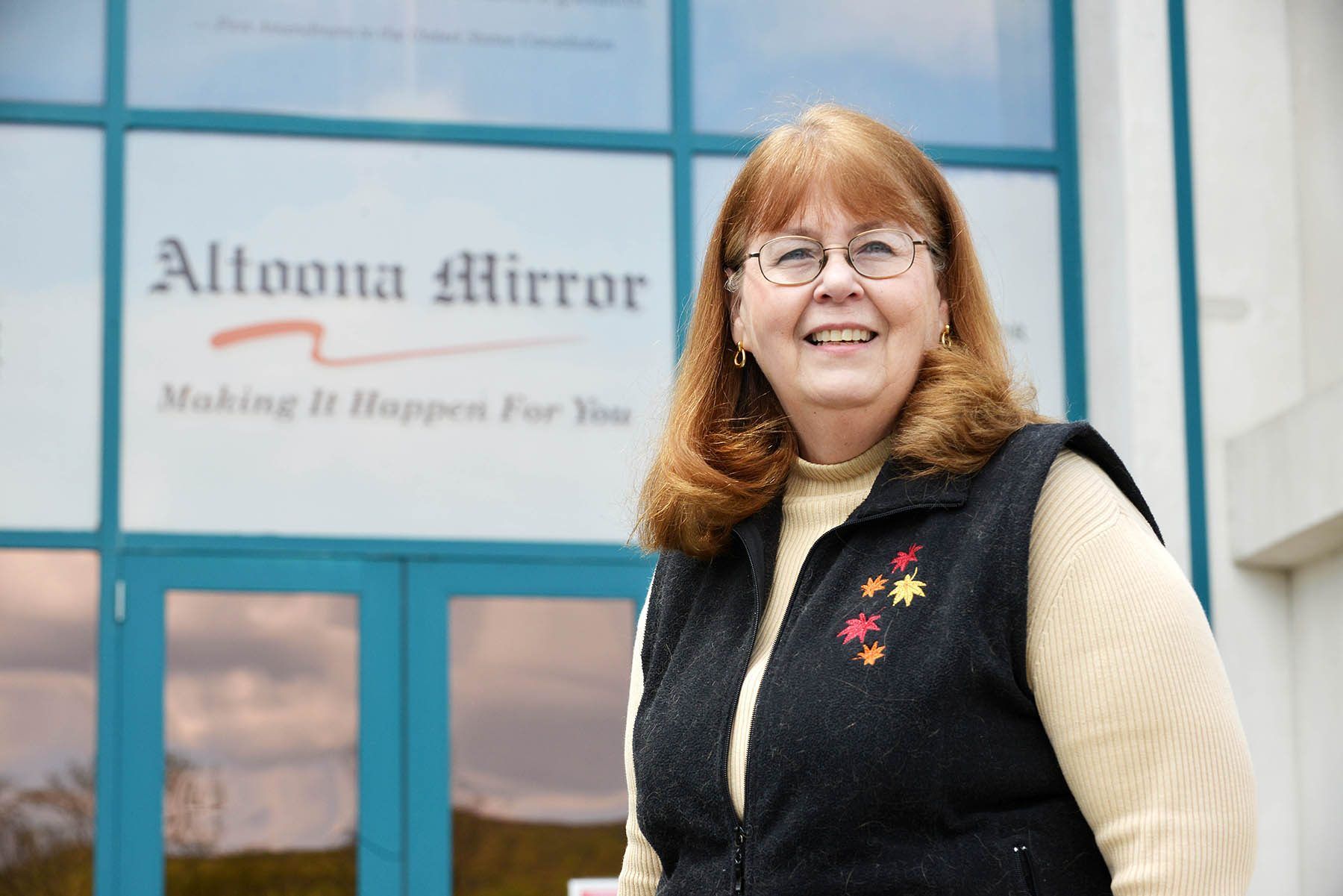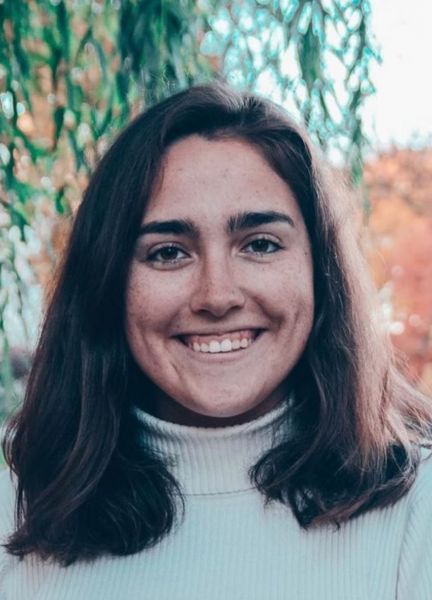Determined professionals
Journalists continue to serve communities in evolving media landscapes

The stories of Kay Stephens, Greg Pickel and Carter Walker aren’t all that different from one another — at least, professionally.
All three are Penn State journalism graduates (’77, ’15 and ’17), who took their first reporting jobs with local outlets around the state of Pennsylvania. Since then, local journalism is where they have remained.
Their roles certainly differ — Stephens, 65, is an Altoona Mirror veteran, who has continued to report the news in her community for 44 years; Pickel, 28, acts as the sports manager of the digital media outlet PennLive and its print component, the Patriot-News in Harrisburg, where he has reported and edited for over a decade; and Walker, 26, has served the Lancaster community for more then three years as a county government and investigative reporter for LNP Media Group.
The Altoona Mirror, Patriot-News and LNP stand as three of many regularly produced print newspapers in Pennsylvania. However, as digital media advances, the once vital, national and local role played by newspapers continues to diminish.
According to Stephens, Pickel and Walker, each of their outlets has felt that hit in various ways — some drastic, and some more predictable and recoverable.
Despite changing media landscapes and the circumstances their respective outlets face, each of the three journalists voices the same sentiment: an unwavering passion for delivering the news their communities need.
We're trying to do as much as we can do with the staff we have, but it's not enough to suit me, because I know what it used to be.
Kay Stephens ('77) of the Altoona Mirror
‘As much as we can with the staff we have’
Stephens’ favorite part of her job is telling people what they don’t know.
Over the past four-plus decades she has spent with the Mirror, she has managed to share that information across the newspaper’s circulation area — primarily Blair County, but also including Bedford, Cambria, Clearfield, Huntingdon and Centre counties.
From reporting on general assignments, education, municipal and county government and county court, as well as copy editing and designing pages for the newspaper, Stephens has left a mark in many sections of the Mirror’s print and online products.
However, as media landscapes continue to evolve, she has found it increasingly difficult for the newspaper to produce its best print product (the Mirror’s more prioritized mode of news sharing) versus its online and social media platforms.
“We're trying to do as much as we can do with the staff we have, but it's not enough to suit me, because I know what it used to be,” Stephens said. “Some other people might say, ‘The days of wide-ranging coverage in your newspaper ... maybe they are behind us.’ Because people are getting [news] from other sources.”
Financial issues at the Mirror have prompted staff cuts, which further contribute to operational impacts for the outlet. According to Stephens, the Mirror currently employs five full-time news reporters. At its fullest staff — last attained during the 1990s, she recalled — the Mirror had 12 full-time news reporters.
Due to a multitude of reasons, Stephens also noted the Mirror sometimes struggles with producing enough content to fill an entire newspaper.
“If you would have asked [what I am most passionate about] two years ago, I would have said, just looking into anything and everything,” Stephens said. “But what I'm passionate about now is trying to keep the paper filled on a daily basis with stories. We have so few reporters that we have to devote our resources to making sure we have stories in the paper. Otherwise, it's just a tough day.”
‘Stuff I think has real value to the community'
To other journalists across Pennsylvania — Pickel and Walker included — the state of their outlets’ print products may feel slightly less daunting.

Carter Walker is a member of LNP Media Group’s investigative team, producing stories for daily and longer-term deadlines. (Photo: Suzette Wenger)
However, Walker expressed similar sentiments to Stephens, regarding the amount of work journalists on smaller staffs must produce to keep up.
As someone who reports for LNP Media Group’s investigative team, Walker said the division also operates as a daily team, meaning they are expected to handle stories that have varying deadlines, from the same day to weeks in advance.
“I think the biggest challenge is getting out stories on a daily or a multiple-times-a-week basis,” Walker said. “We can populate our newspaper and our website, and balancing that between investigative work … that takes a long time. But it’s the stuff I think has real value to the community. That's the challenge.”
While Walker produces content for LNP Media Group’s online and print components, he finds himself a bit more intrigued by his coverage’s digital presence.
“I know that the audience of people covering [politics and government] or [people who] would be interested in the topics that I'm talking about get their news online,” Walker said. “So I guess that probably is why my focus tends to skew more that way — me looking at the things that I'm interested in, or [I am] interested in [who will be] looking for this online, as well.”
‘A challenging time for media companies’
While Pickel expressed his sense of security in both PennLive and the Patriot-News platforms, he noted the impact the COVID-19 pandemic has placed on media outlets across the country.
The most significant challenge Pickel finds in his own duties for PennLive and the Patriot-News — which prints three days a week, having moved from seven days a week in 2013 — is remaining in tune with his audience, and providing them with what they want to consume.
“Obviously, any media outlet or media company could run with the ever-changing landscape of the internet,” Pickel said. “Yesterday, it may have been Twitter and Facebook. Today, it might be TikTok and YouTube. Tomorrow, Instagram could be the biggest social media platform.”
Regarding both print and digital audiences, Pickel said members of the PennLive and Patriot-News teams have discovered that many of the same people are online and print readers, and they share many of the same interests.
I think that's probably the biggest challenge is just trying to stay ahead of not only the trends and readership habits of people on those platforms that currently exist, but what's next and how can you make sure people using those don't forget that you are there.
Greg Pickel ('17) of PennLive and the Patriot-News
“It's a challenging time for media companies all over the place,” Pickel said. “It's interesting because [the media has] delved into a lot of things. I don't think most people ever would have thought that we'd be diving into what the pandemic brought us.”
That considered, Pickel said a lot of what PennLive publishes mirrors what Patriot-News audience wants as well.
“For example, there might be a story out of Philadelphia that we tie back to Penn State, or we tie back to a school around here. Maybe Harrisburg High School is playing a non-conference game against St. Joe's Prep. So, even though that story has more, it reaches farther than the Harrisburg area.
“I think that's probably the biggest challenge is just trying to stay ahead of not only the trends and readership habits of people on those platforms that currently exist, but what's next and how can you make sure people using those don't forget that you are there.”
‘I think newspapers are going to be around forever’
Despite her concerns related to the Mirror and local media, Stephens said she knows local journalists will continue to play crucial roles in their communities.
The Mirror is one of many local newspapers still trying to “do it all,” she said, as they continue to provide a wide range of reporting — local and national news, entertainment information, sports, obituaries, comics and more.
“Newspaper journalists especially are the ones who are asking important questions, looking for information to share with their readers,” Stephens said. “And more than likely, [they] are the ones who are going to raise challenges when it comes to closed-door meetings that violate the state’s Sunshine Law.”
When reflecting on her career at the Mirror, she recalled covering stories from the Johnstown Flood of 1977 to county court jury trials to illegal drug rings in the area.
On a day-to-day basis, though, she tries to dig for those stories to deliver to the community — double checking the county court calendar, attending court and county governmental hearings and keeping tabs on “dozens” of criminal and civil court cases.
“The day-to-day work of a newspaper reporter [at a] small city publication hasn’t changed significantly,” Stephens said. “I’m always looking every day for something new to tell the readers.”
Upon asking Stephens what her strengths are, she recalled a memory from years past.
While covering an Altoona Area School Board meeting, Stephens witnessed a local taxpayer and parent tell the board that without Stephens’ reporting on meetings, she wouldn’t be able to understand the board’s actions. That memory still sticks with Stephens.
“At that time, and still today, I consider that comment to be high praise,” Stephens said. “Based on the way some of our local governing boards conduct their meetings, it can be — but shouldn't be — difficult to understand what our local leaders are doing.”
As media landscapes continue to evolve, Stephens said she sometimes struggles when trying to predict what is ahead for the Mirror and newspapers everywhere.
In Stephens’ mind, putting together a plan for the Mirror that involves more online and digital resources seems smart. However, she said she respects the newspaper’s ownership at Ogden Newspapers, which owns over 50 daily newspapers across the country — including 12 print products in Pennsylvania — as well as multiple weeklies and a magazine division.
According to Stephens, Ogden Newspapers has not chosen to feed extensive resources into the Mirror’s digital presence. She said the Mirror will continue to carry out a print-first focus — likely catering largely to older readers — and that for, “right now, that’s okay.”
She plans to keep doing her job every day, no matter the Mirror’s mode of news sharing.
“I don't know; I think newspapers are going to be around forever. But, at the same time, I see them changing,” Stephens said. “I see other avenues popping up to provide information, but I can tell you that, as far as local news goes, it's your local newspaper that's still trying to do its job. And they'll keep trying to do their job until there's not enough money for that.”



 @eljoro123
@eljoro123